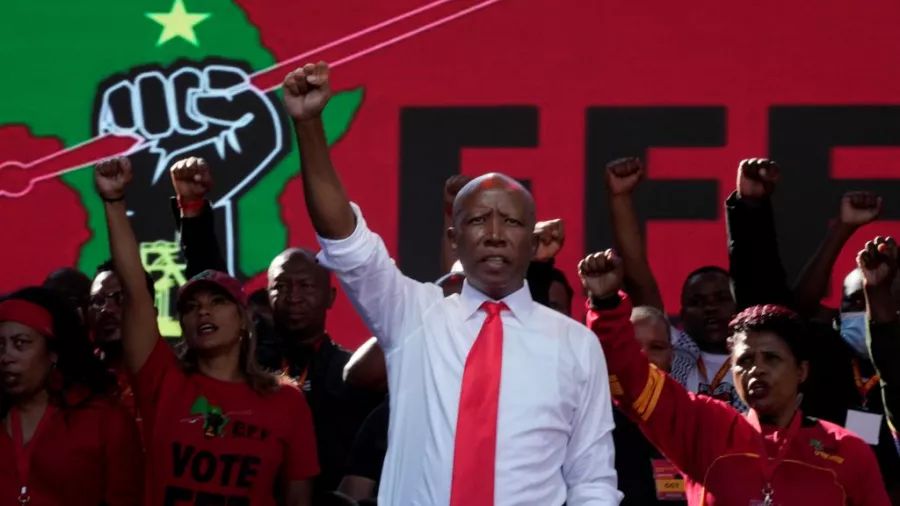SA: Constitutional court hears PhalaPhala case, EFF hopes for an impeachment vote
3 min read
Supporters of South Africa’s Economic Freedom Fighters (EFF) gathered outside the Constitutional Court in Johannesburg on Tuesday, November 26, as the court heard proceedings regarding the Phala Phala scandal involving President Cyril Ramaphosa. The case, brought forward by two opposition parties, seeks to revive impeachment proceedings against Ramaphosa over the controversy surrounding the discovery of a large sum of money hidden at his private farm.
The scandal first erupted in 2022 when it was revealed that over half a million dollars in cash had been stolen from Ramaphosa’s Phala Phala farm and kept secret for years. The money, which had reportedly been found hidden at the farm, became the center of public outrage and raised questions about the president’s handling of the situation. Despite the gravity of the scandal, a vote in Parliament, where Ramaphosa’s African National Congress (ANC) holds a majority, blocked any move towards impeachment.
At the heart of the opposition’s argument is a desire for transparency and accountability. One supporter of the EFF, Thebe, expressed frustration with Ramaphosa’s failure to explain the origin of the funds found at Phala Phala. He compared the current situation to the alleged abuse of power by former President Jacob Zuma, saying, “All we want is for the president not to abuse his power the same way that Zuma did at his private residence.” Thebe also criticized the ANC for using its parliamentary majority to shield Ramaphosa from any legal repercussions.
EFF leader Julius Malema, who has been a vocal critic of Ramaphosa, also spoke passionately outside the court. He called for a full parliamentary investigation into the scandal, stressing the importance of holding the executive accountable. “We are here to hold the executive accountable. The ANC came inside court to defend corruption, to defend a man who did not dispute that there was money at his farm,” Malema told the crowd. He vowed that the EFF would continue its efforts to remove Ramaphosa from office, stating, “Comrades, we are going to win this case against Ramaphosa. And we’ll call him back in parliament and start an impeachment process because the ANC used its majority in an unconstitutional manner.”
The EFF, along with the African Transformation Movement (ATM), argues that Parliament failed to perform its constitutional duty by not properly investigating Ramaphosa’s involvement in the Phala Phala scandal. Both parties contend that the president should face accountability for the money found at his farm, which remains unexplained to this day.
Despite these calls for impeachment, Ramaphosa has faced little consequence so far. Financial authorities, the public protector, and police all cleared him of any wrongdoing after conducting their investigations. The president has maintained that the money was the result of a private business transaction and not from illicit activities. However, critics argue that the secrecy surrounding the incident raises serious concerns about transparency and governance.
The push for impeachment could present significant risks for Ramaphosa, the leader of Africa’s most advanced economy. While he was re-elected for a second term in June with the support of coalition partners, the political landscape remains fraught with challenges. The EFF and ATM are relatively small parties, and any successful impeachment would require support from other members of the ANC-led coalition, which is seen as unlikely given the party’s strong majority in Parliament.
Impeachment proceedings would require broad political consensus, which is hard to achieve, especially given the ANC’s dominance in the legislative body. With the ANC’s current backing of Ramaphosa, the chances of a successful impeachment are slim, despite the efforts of the opposition. However, the EFF and ATM are determined to continue their efforts, arguing that the failure to impeach Ramaphosa would allow corruption to persist at the highest levels of government.
The Constitutional Court’s ruling on this matter is expected to take weeks, or even months, as the court typically deliberates extensively on cases of such importance. Should the court decide to revive impeachment proceedings, it could set the stage for a long and contentious political battle, one that could have significant implications for Ramaphosa’s presidency and for the stability of South Africa’s government.
As the court continues its deliberations, all eyes are on the potential for a major political shift in the country. The outcome could determine not only the future of Ramaphosa’s leadership but also the broader trajectory of South African democracy and the fight against corruption.







